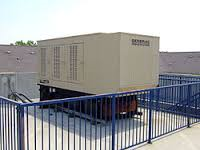
Planning ahead requires preventative maintenance!
One of the greatest fears for high-rise condo dwellers during severe weather is a power failure.
Electricity and heat can be out for hours or days. Without power, elevators may be non-operational stranding residents in their high-rise homes.
This is when your building’s emergency generator needs to work.
During an emergency situation it will be difficult to obtain assistance if your emergency generator fails. Many other generators will likely experience similar problems and deemed priority over a high-rise residential building. Retirement homes, hospitals and emergency services will likely be supported before consideration is given to residential properties.
When the power goes out your emergency generator is required to support life safety systems. This may include one elevator, fire alarm panels, fire pumps, exit signs and emergency lighting. If there is sufficient capacity providing power to booster pumps and make-up air units will make life in the condo more bearable. It is unlikely to include electricity to suites, water or other services requiring power.
Most generators will operate for a period ranging from hours to days. Supporting more than basic life safety systems will reduce the operational time for these systems.
Emergency generators sit unused for most of the time. Ed Porasz of M & E Engineering, a company experienced in emergency generator design services, advises “this can result in a range of problems from blocked coolant lines or filters to leaks, low fuel level, poor fuel quality and failure to generate the power required. Ensuring your emergency generator will work when needed requires regular maintenance. This involves periodic testing according to code requirements, replacement of fuel or filtration of fuel, and mechanical maintenance and/or replacement of parts.”
Equally important during emergency situations is organizing those capable of assisting individuals requiring assistance and providing this assistance. It may be necessary to help evacuate individuals from a building or render in-suite support.
One way to render assistance during a prolonged emergency situation is to stock up on emergency rations – water, non-perishable food not requiring refrigeration, batteries, flashlights, manual can opener and possibly blankets – for delivery to those in need. Twice daily visits to those residents, during an emergency, can help to reassure them and ensure their safety.
Developing and adhering to regular testing and a preventive maintenance schedule is the best way to ensure your emergency generator does not fail during an emergency. Other measures to prepare for an emergency include educating residents on how to survive without power and water for a few days, and developing a list of residents incapable of managing stairs inclusive of suite number and phone number.
Publication Date: March 2017




